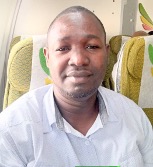
Integrating Environmental Physiotherapy into physiotherapy training at University of Health and Allied Sciences (UHAS), Ho, Ghana
Physiotherapy education in Ghana is a 4-year programme at UHAS to be awarded a Bachelor of Physiotherapy (BPT), which is the entry level to practice in Ghana. Physiotherapists can then proceed to do a Master’s level for specialization. Teaching faculty at the Department of Physiotherapy and Rehabilitation Sciences (DPRS), UHAS were first introduced to environmental physiotherapy during the World Physiotherapy Congress at Dubai in 2023. Currently there are no EPT modules in our curriculum. However, Faculty are looking to introduce modules that promote environmental sustainability as well as climate change and its effects on health of people. Of particular interest will be education about environmental degradation. The purpose of such training will be to develop skilled physiotherapists who are highly proficient in physiotherapy practice but are additionally socially and environmentally responsible assets for their communities. It is important for our students to recognize the growing impact of environmental degradation, pollution and climate change anxiety on the health of our patients and thus, incorporating EPT elements into our curriculum is in order.
Strategies for integrating environmental physiotherapy into physiotherapy training at UHAS
To understand the essential role physiotherapists’ play in mitigating the effects of environmental degradation, pollution and climate change anxiety on health, the DPRS is considering introducing EPT-related seminars for 3rd and 4th year physiotherapy students that target specific environment effects facing our society. With the incorporation of environmental sustainability and climate-resilient strategies into our BPT programme, students will be trained to appreciate how environmental factors can influence physical and mental functions, activities, lifestyles and participation outcomes and thus enhance their clinical reasoning in this regard.
Selected topics for consideration in the intended modules
The effects of illegal gold mining (locally termed galamsey) on the physical health of the population.
The effects of air pollution and extreme temperatures on cardiorespiratory health of people and development of other conditions.
The impact of inadequate green environment and recreational parks on physical activity levels of people.
The adaptation of physical activity programmes for vulnerable populations (e.g. persons with disabilities and those living with chronic illnesses), considering climatic variations that may exacerbate symptoms such as pain and fatigue.

Cosmos Yarfi (PT)
Head of Department of Physiotherapy and Rehabilitation Sciences, University of Health and Allied Sciences, Ghana
Cosmos Yarfi is a physiotherapist by training with research interests in stroke rehabilitation, global health and climate change anxiety. He is a member of the Ghana Physiotherapy Association and World Stroke Organization.
Future Plans
Moving forward, the DPRS aims to add EPT as a course in our curriculum during our subsequent curriculum review. We hope to run EPT-related short courses and strengthen partnerships with other organisation within and outside UHAS to collectively advocate for environmentally sustainable healthcare for our planet. We plan to use digital resources, including an online platform that offers educational materials and best practices to support learning and professional development in EPT. Hopefully we can form a local EPT interest group among physiotherapists in Ghana. This group can host regular webinars, workshops and seminars to educate physiotherapists and the general public about the associated health risks of climate change and environmental degradation. Additionally, we aim to promote further research in the field of EPT to further promote sustainable physiotherapy practices.
Conclusion
The incorporation of EPT into the BPT curriculum at UHAS will mark an important advancement toward a more sustainable and responsible approach to healthcare. By raising awareness about EPT, adapting intervention strategies, and encouraging environmental responsibility, we will be equipping the next generation of physiotherapists to address global health challenges with a holistic and forward-thinking perspective.
References
Header image by Emmanuel Offei on Unsplash

0 Comments